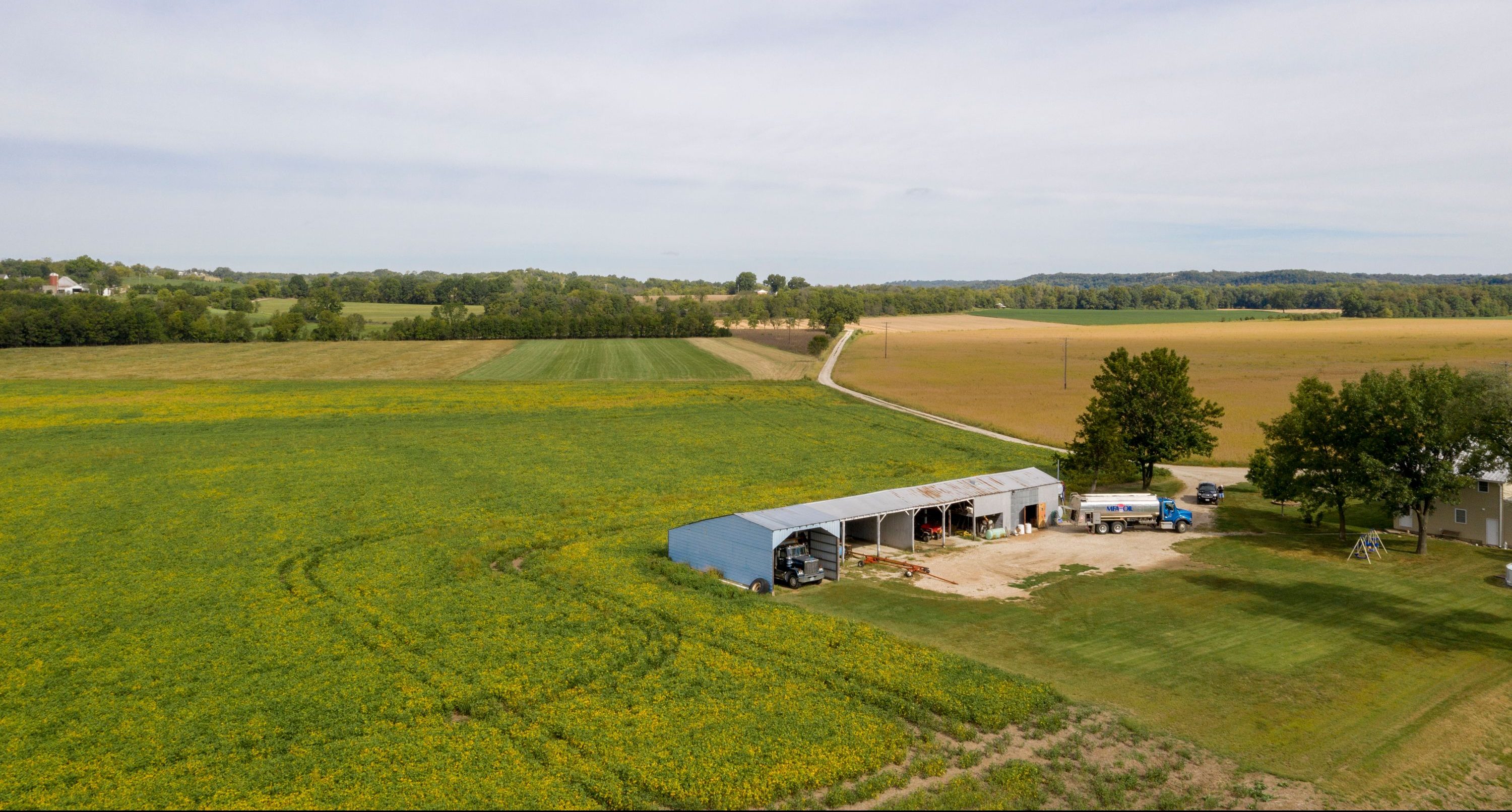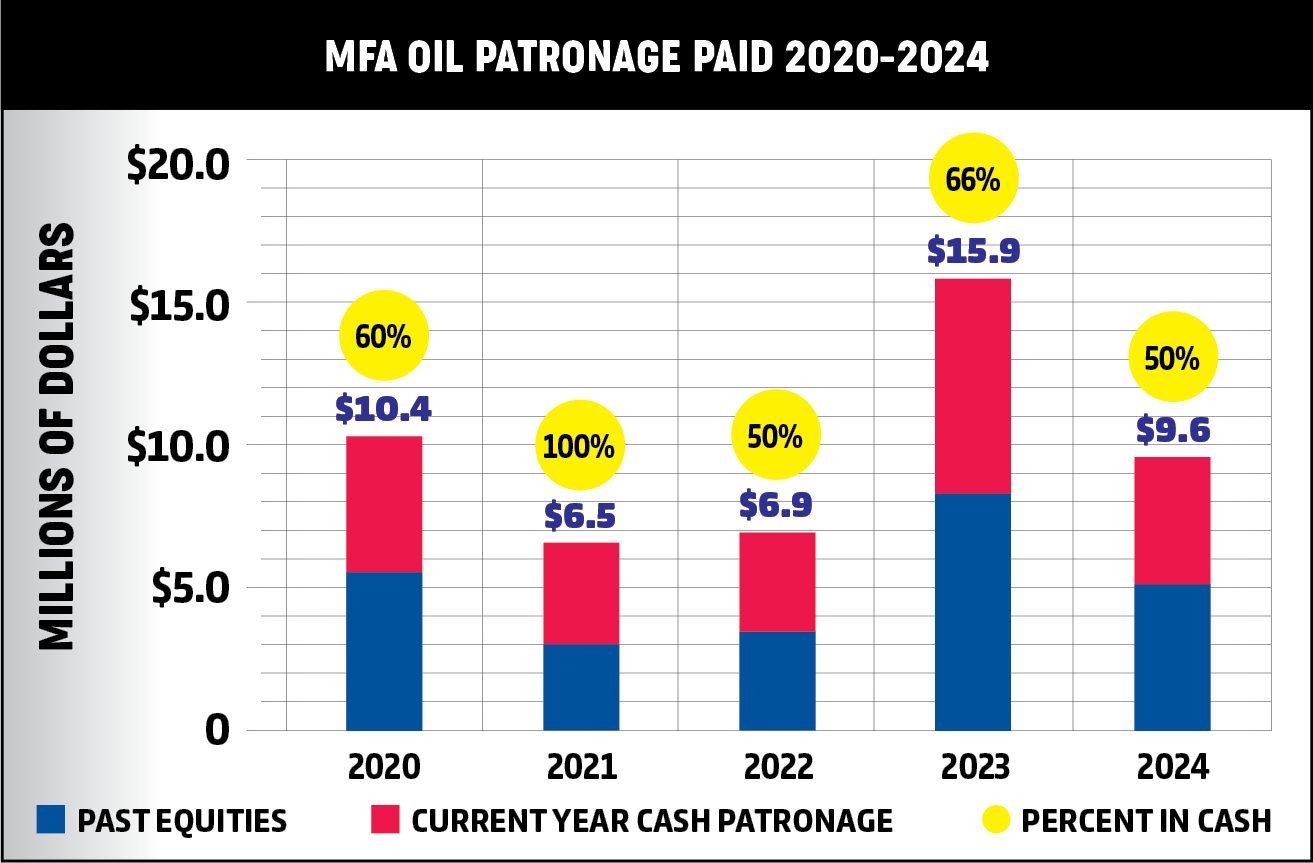
Co-op Membership FAQs
Membership
You are eligible to become a co-op member if you meet these two requirements:
- You’re an agricultural producer or own land used for agricultural production.
- You buy at least $1,000 from MFA Oil bulk fuel, propane or Petro-Card 24 accounts tagged with membership during the company’s fiscal year (Sept. 1 – Aug. 31).
Contact your local MFA Oil office for assistance or use the contact us form.
We do not charge fees for membership in the cooperative, however, you do need to buy at least $1,000 from MFA Oil bulk fuel, propane or Petro-Card 24 accounts tagged with your membership during the company’s fiscal year (Sept. 1 – Aug. 31) to qualify for patronage.
Contact the Records Department at (800) 366-0200.
Yes.
Patronage Dividends
At the end of each fiscal year, the company conducts a formal accounting of its income and expenses. When MFA Oil makes a profit, the Board of Directors decides how best to use the money. Usually, a percentage of the profits is kept on hand to help fund the cooperative’s operations. The remainder is distributed to the membership in the form of qualified patronage refunds.
Qualified patronage disbursements are made at the discretion of the Board of Directors and vary from year to year depending on the financial condition of the cooperative. Individual members’ patronage dividends are based on a percentage of the total money spent with the cooperative in any given fiscal year (Sept. 1 – Aug. 31) on products – such as gasoline, diesel, propane and lubricants – purchased using bulk fuel, propane and Petro-Card 24 accounts that are tagged for membership.
Patronage checks are typically dispersed in February.
Checks are mailed to the member’s billing address on file. Your billing address may be different than your delivery address(es).
Any earnings retained by the cooperative to fund its operations are held in membership equity to be paid at a later date. The Board of Directors determines the percentage of retained earnings each year and the time frame for when the equity will be redeemed. In recent years, equities have typically been redeemed on a 10- to 12-year basis.
The biggest difference between qualified and non-qualified patronage distributions is timing of cash flows and tax deductions.
When a cooperative deducts its patronage refunds to its membership from its taxable income and the members agree to include it in their taxable income – that is qualified patronage. In these situations, the co-op must pay at least 20 percent of any qualified patronage refund in cash.
In the case of non-qualified patronage distributions, both the cooperative and the co-op member do not include the amount in taxable income until it is paid in cash at a later date. When the non-qualified equity is paid out in the future, the cooperative will take a tax deduction and the member will include the amount paid in that year’s taxable income.
The only provision allowing for accelerated issuance of equities is the death of the equity holder. Any remaining equity is then paid to the estate or trust of the member.
Contact the Records Department at (800) 366-0200.

Qualified patronage dividends are considered taxable income by the federal government and must be reported to the IRS. The entire amount allocated to the customer is reported on a 1099-PATR that is issued in January the year following initial payment.
Non-qualified patronage is not included as a tax deduction for the co-op, and you do not include this amount in your taxable income. When the non-qualified equity is paid out in cash in the future, the cooperative will take a tax deduction and you will include the amount paid in your taxable income.
MFA Oil will send you a 1099-PATR form by mail. Use the 1099-PATR to complete your tax return.
The 1099-PATR is mailed in January the year following initial payment. For example:
- John Doe is allocated $1,000 for the 2019 fiscal year.
- He receives a check for $800 in February 2020, and $200 is placed in his equity account.
- He will receive a 1099-PATR in January 2021 for the full $1,000. The entire $1,000 must be reported to the IRS when John Doe files his 2020 return (usually by April 15, 2021).
Because 1099-PATRs are issued in January and checks are issued in February, it is easy to become confused about which amount to report on your annual tax return. The 1099-PATR you receive each January is for the check you received in the prior year (not the check you may receive in the same year). As shown in the example above, the 1099-PATR form reports the patronage allocated to you the previous year.
Occasionally, members will ask to have their equity balance paid to them in a lump sum. The only provision allowing for accelerated issuance of equities is upon death of the equity holder, at which time any equities may be paid to the equity holder’s estate or trust. We cannot pay out an equity balance because a business or partnership has dissolved.
Elections
Any member who is in good standing with the cooperative.
Notify your local manager that you would like to be placed on the local voting ballot. The elections are held at local annual meetings.
Delegate elections vary by location, but most start in July and end by November. Elections for the Board of Directors are held at the Annual Delegate Meeting.
Attend your local annual meeting and fill out a ballot.
As a delegate you are responsible for:
- Help your bulk plant manager secure new customers and farmer members.
- Offer your help and suggestions.
- Represent your local MFA Oil membership in all matters pertaining to your bulk plant.
- Stay informed on company activities and pass information along to members and prospective members in your area.
- Attend your local and district meetings.
- Attend the MFA Oil Annual Delegate Meeting.
The date varies from year to year, but it is usually held in December.
Other Questions?
If you have any other questions, or would like to become a member, please contact us.

